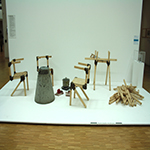Euroacademia Conferences
 Europe Inside-Out: Europe and Europeanness Exposed to Plural Observers (9th Edition) April 24 - 25, 2020
Europe Inside-Out: Europe and Europeanness Exposed to Plural Observers (9th Edition) April 24 - 25, 2020 Identities and Identifications: Politicized Uses of Collective Identities (9th Edition) June 12 - 13, 2020
Identities and Identifications: Politicized Uses of Collective Identities (9th Edition) June 12 - 13, 2020 8th Forum of Critical Studies: Asking Big Questions Again January 24 - 25, 2020
8th Forum of Critical Studies: Asking Big Questions Again January 24 - 25, 2020 Re-Inventing Eastern Europe (7th Edition) December 13 - 14, 2019
Re-Inventing Eastern Europe (7th Edition) December 13 - 14, 2019 The European Union and the Politicization of Europe (8th Edition) October 25 - 26, 2019
The European Union and the Politicization of Europe (8th Edition) October 25 - 26, 2019 Identities and Identifications: Politicized Uses of Collective Identities (8th Edition) June 28 - 29, 2019
Identities and Identifications: Politicized Uses of Collective Identities (8th Edition) June 28 - 29, 2019 The European Union and the Politicization of Europe (7th Edition) January 25 - 26, 2019
The European Union and the Politicization of Europe (7th Edition) January 25 - 26, 2019 7th Forum of Critical Studies: Asking Big Questions Again November 23 - 24, 2018
7th Forum of Critical Studies: Asking Big Questions Again November 23 - 24, 2018 Europe Inside-Out: Europe and Europeanness Exposed to Plural Observers (8th Edition) September 28 - 30, 2018
Europe Inside-Out: Europe and Europeanness Exposed to Plural Observers (8th Edition) September 28 - 30, 2018 Identities and Identifications: Politicized Uses of Collective Identities (7th Edition) June 14 - 15, 2018
Identities and Identifications: Politicized Uses of Collective Identities (7th Edition) June 14 - 15, 2018
Bertolt Brecht and the Socialist Origins of West German Theater
-
-

-
Presentation speakers
- Samuel Adams, University of Southern California, USA
- Download presentation
Abstract:
The dramatist Bertolt Brecht (1898-1956) was among the most polarizing figures in all of postwar German history. A committed socialist, Brecht settled in East Berlin following WWII and founded the Berliner Ensemble. Theater directors in West Germany (FRG) boycotted Brecht’s plays during the 1953 uprising in East Germany (GDR) and again in response to the 1956 Hungarian Revolution as a way of castigating the young socialist governments. In the aftermath of the 1968 student protests Brecht became a hero of the New Left but by the 1980s a younger generation began to consider his works representative of an outmoded, orthodox Marxism. The scholarly narrative contends that the GDR was economically progressive but culturally conservative; in Brecht’s hands, however, what is often derisively referred to as socialist realism was profoundly expressive and politically dissenting. Brecht’s influence on FRG culture is a story that has yet to be told. By comparing theater productions in the GDR and the FRG this paper reveals that the very tactics viewed as cheap or socialist in East German theaters were hailed as avant-garde in West German theaters by the very same FRG critics. Material shortages faced by Brecht’s production team forced them to use lighting and choreography in innovative ways when elaborate sets were not affordable. Their use of projected images was taken up by dozens of theaters in the FRG. West German theaters also mobilized their audiences, involved them in participatory scenes, staged dramas in alternative locations, and championed the collective theater model pioneered by Brecht. This paper argues that what has long been considered an avant-garde West German theater aesthetic was in fact fundamentally Brechtian with its very foundation in GDR culture.
-
Related Presentations

Production Networks in Europe: A Natural Experiment of the EU Enlargement to the East
- Inmaculada Martínez-Zarzoso
- Anca M. Voicu
- Martina Vidovic

Impact of Cultural Trauma References in Political Discourse: Trianon and the Genesis of Status and Citizenship Laws in Hungary and Slovakia
- Dagmar Kusa
- Veronika Klempova
- Arnold Kiss

Nostalgia for a Great Past
- Peter Seifert















